Percy Sledge - True Love Travels On A Gravel Road (Atlantic 2679)
I just heard that yet another Southern Soul legend has gone on. A much-loved figure throughout his long career, his warmth and love of the music shone through every note that Percy Sledge sang...
Here's an appreciation of Percy I wrote back in 2006:
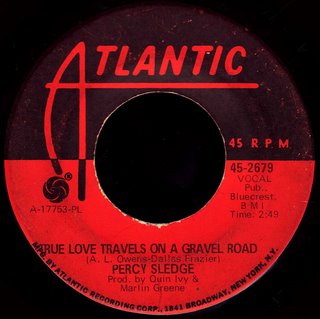
True Love Travels On A Gravel Road
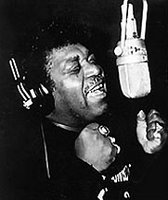 Today's selection presented me with a bit of a problem. I had found it listed as both an A side and a B side, and was counting on the Atlantic discography at Global Dog to be the tiebreaker... only they seem to now be toast [Ed. Note: as of 1/7 Global Dog appears to be back in business. The verdict? - B side!]. In any event, this song you're listening to now is, in my opinion, the best (OK-second best) thing Percy Sledge ever recorded, and one of my favorite soul songs by anybody ever.
Today's selection presented me with a bit of a problem. I had found it listed as both an A side and a B side, and was counting on the Atlantic discography at Global Dog to be the tiebreaker... only they seem to now be toast [Ed. Note: as of 1/7 Global Dog appears to be back in business. The verdict? - B side!]. In any event, this song you're listening to now is, in my opinion, the best (OK-second best) thing Percy Sledge ever recorded, and one of my favorite soul songs by anybody ever.
 I first heard it when Peter Guralnick included it as the opening track on the companion CD to Sweet Soul Music - Voices From The Shadows, in 1992. As many of you know, this was right around the time my wife and I got engaged. The song was high in the rotation in those days, and still does either one of us in... I have yet to listen to it all the way through without jumping out of the ol' chair and singing along with a lump in my throat. I know, I'm a sap.
I first heard it when Peter Guralnick included it as the opening track on the companion CD to Sweet Soul Music - Voices From The Shadows, in 1992. As many of you know, this was right around the time my wife and I got engaged. The song was high in the rotation in those days, and still does either one of us in... I have yet to listen to it all the way through without jumping out of the ol' chair and singing along with a lump in my throat. I know, I'm a sap.
For whatever reason, this song doesn't seem to get any press whatsoever. The silly album reviews of Percy's various greatest hits CDs in places like the 'all' music guide fail to even mention it. Who knows why. B side or not, I wanted to kinda wind down this year's posts with one of my true desert island 45s...
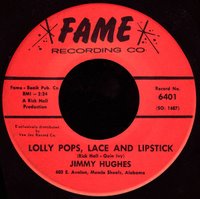 Quin Ivy is yet another of those southern white boys who grew up listening to John R and Hoss Allen over WLAC. He fell in love with the music, and before long was emulating his heroes spinning R&B records as a dee-jay on his hometown radio station in Oxford, Mississippi. He moved on to WMPS in Memphis before landing a job on WLAY in Muscle Shoals, Alabama in the early sixties. Like everyone else in town back then, he got caught up in the 'songwriting fever' that was going around, and began writing lyrics for a young Rick Hall. Ivy was Hall's co-writer on two early Jimmy Hughes recordings, I'm Qualified and Lolly Pops, Lace And Lipstick, the B side of Fame's first release, top 20 R&B hit Steal Away.
Quin Ivy is yet another of those southern white boys who grew up listening to John R and Hoss Allen over WLAC. He fell in love with the music, and before long was emulating his heroes spinning R&B records as a dee-jay on his hometown radio station in Oxford, Mississippi. He moved on to WMPS in Memphis before landing a job on WLAY in Muscle Shoals, Alabama in the early sixties. Like everyone else in town back then, he got caught up in the 'songwriting fever' that was going around, and began writing lyrics for a young Rick Hall. Ivy was Hall's co-writer on two early Jimmy Hughes recordings, I'm Qualified and Lolly Pops, Lace And Lipstick, the B side of Fame's first release, top 20 R&B hit Steal Away.
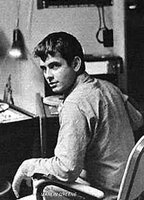 Quin opened a record store in Sheffield called Tune Town, and watched as Rick's new Fame studio grew. Fame soon had more business than it could handle, and Ivy approached Hall with an idea; what if he were to open his own small studio to record the people Hall was turning away? Rick was all for it, and Ivy opened his Norala (presumably Northern Alabama) studio across the street from Tune Town in late 1965. He had initially asked Rick to let him hire Dan Penn as his engineer, but he turned him down and introduced him to local guitarist Marlin Greene instead. The two became fast friends, and Ivy soon gave him a percentage of the business.
Quin opened a record store in Sheffield called Tune Town, and watched as Rick's new Fame studio grew. Fame soon had more business than it could handle, and Ivy approached Hall with an idea; what if he were to open his own small studio to record the people Hall was turning away? Rick was all for it, and Ivy opened his Norala (presumably Northern Alabama) studio across the street from Tune Town in late 1965. He had initially asked Rick to let him hire Dan Penn as his engineer, but he turned him down and introduced him to local guitarist Marlin Greene instead. The two became fast friends, and Ivy soon gave him a percentage of the business.
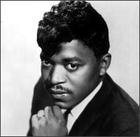 Although there appears to be several versions of the story, this is basically what happened next; Jimmy Hughes' cousin was an orderly at Colbert County Hospital, and had begun singing with a local combo called the Esquires nights and weekends. The band was working the same fraternity circuit that the Fairlanes and the Mark Vs had done a few short years before. Percy Sledge and fellow Esquires Calvin Lewis and Andrew Wright had come up with a song that they thought could be a hit. They loaded Wright's Hammond B3 into the back of a pickup and hauled it down to Fame. Dan Penn recorded the tune, and pleaded with Hall for a chance to produce them. Rick flatly refused, and Dan sent them over to see Ivy at Norala.
Although there appears to be several versions of the story, this is basically what happened next; Jimmy Hughes' cousin was an orderly at Colbert County Hospital, and had begun singing with a local combo called the Esquires nights and weekends. The band was working the same fraternity circuit that the Fairlanes and the Mark Vs had done a few short years before. Percy Sledge and fellow Esquires Calvin Lewis and Andrew Wright had come up with a song that they thought could be a hit. They loaded Wright's Hammond B3 into the back of a pickup and hauled it down to Fame. Dan Penn recorded the tune, and pleaded with Hall for a chance to produce them. Rick flatly refused, and Dan sent them over to see Ivy at Norala.
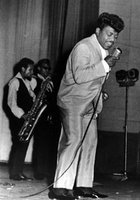 Jimmy Johnson was working part time at Tune Town, and had agreed to 'work the board' and engineer Norala's sessions on the primitive equipment Ivy had assembled. They worked and re-worked the song the Esquires had brought them in the fall of 1965, using studio musicians who were 'moonlighting' from Fame. The version they eventually brought to Rick Hall would feature Spooner Oldham on the Farfisa, Roger Hawkins on drums and Junior Lowe on the bass along with Marlin Greene on guitar. As soon as Hall heard it, he knew it was a hit, and called Jerry Wexler at Atlantic. Although Wexler was skeptical at first, Rick assured him that he felt "strong as death" that the song would be a #1 record.
Jimmy Johnson was working part time at Tune Town, and had agreed to 'work the board' and engineer Norala's sessions on the primitive equipment Ivy had assembled. They worked and re-worked the song the Esquires had brought them in the fall of 1965, using studio musicians who were 'moonlighting' from Fame. The version they eventually brought to Rick Hall would feature Spooner Oldham on the Farfisa, Roger Hawkins on drums and Junior Lowe on the bass along with Marlin Greene on guitar. As soon as Hall heard it, he knew it was a hit, and called Jerry Wexler at Atlantic. Although Wexler was skeptical at first, Rick assured him that he felt "strong as death" that the song would be a #1 record.
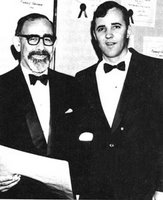 He was right, of course. Wexler had worked out a deal with Ivy to lease the single (a deal that would include a 2% 'finders fee' for Rick Hall), but he wanted him to re-cut it, and clean it up a little. Happy to have landed a deal with a major label, Quin set to work polishing the track, making sure to fix the off-key horn section, and Percy's painfully out of tune vocals. He sent the new master off to New York, and Atlantic released When A Man Loves a Woman in April of 1966. It would quickly soar to #1 on both the R&B and pop charts, and was just an absolute monster. Much to Ivy's amazement, the big company had used the original version by mistake!
He was right, of course. Wexler had worked out a deal with Ivy to lease the single (a deal that would include a 2% 'finders fee' for Rick Hall), but he wanted him to re-cut it, and clean it up a little. Happy to have landed a deal with a major label, Quin set to work polishing the track, making sure to fix the off-key horn section, and Percy's painfully out of tune vocals. He sent the new master off to New York, and Atlantic released When A Man Loves a Woman in April of 1966. It would quickly soar to #1 on both the R&B and pop charts, and was just an absolute monster. Much to Ivy's amazement, the big company had used the original version by mistake!
It's hard to overstate the incredible power of this song that came up out of the woods of Alabama and somehow slowed everything down, defining the meaning of romance for an entire generation in the process. It still gives me chills.
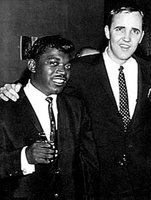 Percy Sledge had put Muscle Shoals on the map, and his brand of deep southern soul along with it. Sledge's follow up record, Warm And Tender Love (the Joe Haywood song reportedly pitched to Wexler by Bobby Robinson backstage at the Apollo), would hit #5 R&B (#17 pop) despite Ivy's 'Mr. Whitebread' production. Incredibly, it was recorded at the same Norala session as all time Penn-Oldham classic It Tears Me Up in May of 1966, while When A Man Loves a Woman was still topping the charts.
Percy Sledge had put Muscle Shoals on the map, and his brand of deep southern soul along with it. Sledge's follow up record, Warm And Tender Love (the Joe Haywood song reportedly pitched to Wexler by Bobby Robinson backstage at the Apollo), would hit #5 R&B (#17 pop) despite Ivy's 'Mr. Whitebread' production. Incredibly, it was recorded at the same Norala session as all time Penn-Oldham classic It Tears Me Up in May of 1966, while When A Man Loves a Woman was still topping the charts.
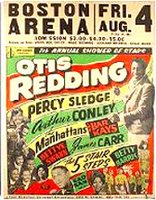 Needless to say, Sledge had gone from hospital orderly and weekend warrior to the big time in about six months. Second only to Otis Redding in this poster at left, it must have been quite an adjustment. Suffering from 'nervous exhaustion,' Sledge reportedly checked himself in to the hospital where he used to work for a week in late 1966. Singles like Baby Help Me and Penn-Oldham's Out Of Left Field barely made the R&B top 40 in early 1967 and, as is often the case, Percy was having trouble duplicating his initial big smash.
Needless to say, Sledge had gone from hospital orderly and weekend warrior to the big time in about six months. Second only to Otis Redding in this poster at left, it must have been quite an adjustment. Suffering from 'nervous exhaustion,' Sledge reportedly checked himself in to the hospital where he used to work for a week in late 1966. Singles like Baby Help Me and Penn-Oldham's Out Of Left Field barely made the R&B top 40 in early 1967 and, as is often the case, Percy was having trouble duplicating his initial big smash.
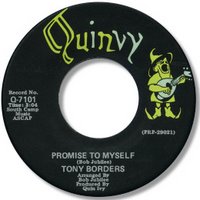 Ivy was able to build a new facility by then, however, and opened Quinvy Studios across town on Broadway in Sheffield. He would soon create his own labels as well, and great records by local talent like Tony Borders and Bill Brandon were released on his Quinvy and South Camp imprints. They remain some of the rarest, and best, of the Muscle Shoals 45s of the late sixties (if you can find them!).
Ivy was able to build a new facility by then, however, and opened Quinvy Studios across town on Broadway in Sheffield. He would soon create his own labels as well, and great records by local talent like Tony Borders and Bill Brandon were released on his Quinvy and South Camp imprints. They remain some of the rarest, and best, of the Muscle Shoals 45s of the late sixties (if you can find them!).
Percy was back in the top ten with the fantastic Take Time To Know Her in the spring of 1968, and continued to tour constantly. Sudden Stop and My Special Prayer would hover around the top 40 later that year.
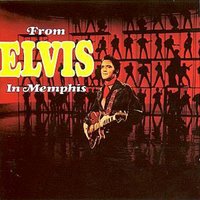 In early 1969, RCA booked Elvis into Chips Moman's (and Dan Penn's) American Studios in Memphis. American was in the middle of an incredible run of hits (like Cry Like A Baby) at that point, and RCA was trying to 'capture lightning in a bottle' and revitalize the King's sagging career. The album they came up with is an absolute classic, with 'country soul' songs like Suspicious Minds, In The Ghetto, and Kentucky Rain becoming huge chart hits. The industry, of course, took notice, and Presley's 'comeback' had begun.
In early 1969, RCA booked Elvis into Chips Moman's (and Dan Penn's) American Studios in Memphis. American was in the middle of an incredible run of hits (like Cry Like A Baby) at that point, and RCA was trying to 'capture lightning in a bottle' and revitalize the King's sagging career. The album they came up with is an absolute classic, with 'country soul' songs like Suspicious Minds, In The Ghetto, and Kentucky Rain becoming huge chart hits. The industry, of course, took notice, and Presley's 'comeback' had begun.
Quin Ivy apparently took notice as well. He had made the top 40 with Sledge's syrupy version of Love Me Tender in 1967, and figured if it was 'country soul' the people wanted, who better to give it to them than the man who helped invent it! Sledge covered Any Day Now (as Presley had done on the album), and broke the top 40 for Atlantic again in April of 1969. True Love Travels On A Gravel Road was written by 'Music Row' giants Dallas Frazier and 'Doodle' Owens and included on the Presley album. Ivy apparently recorded Percy's remarkable version we have here today in September of that year. It was released as the flip of Faithful And True, a Dan Penn-Marlin Greene slow dance, and may well have been the B side, as the romantic ballad was viewed as Percy's 'bread and butter'.
 I've long suspected that the positively awesome lead guitar on here is furnished by the great Eddie Hinton, and Bruce Schurman has confirmed for us over on the Mighty Field Of Vision Group that Hinton did play on the session along with Marlin Greene. He's not sure who takes the lead, however. In any event, neither side of the record even dented the charts. Changing times, along with Atlantic's declining interest in their R&B artists, may have contributed to that. I don't know. All I can say, once again, is how much this record continues to floor me. Boy, is it good.
I've long suspected that the positively awesome lead guitar on here is furnished by the great Eddie Hinton, and Bruce Schurman has confirmed for us over on the Mighty Field Of Vision Group that Hinton did play on the session along with Marlin Greene. He's not sure who takes the lead, however. In any event, neither side of the record even dented the charts. Changing times, along with Atlantic's declining interest in their R&B artists, may have contributed to that. I don't know. All I can say, once again, is how much this record continues to floor me. Boy, is it good.
Quin Ivy walked away from the whole thing in 1970, and went on to become a professor of Business Administration back in Mississippi.
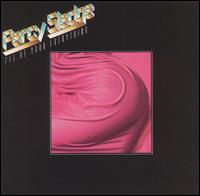 Although nothing much was happening, Sledge hung in there with Atlantic until 1973 when a song called Sunshine barely made the charts. He signed with manager Phil Walden's Capricorn label the following year. Through a 'special arrangement' with Walden, the Ivy produced I'll Be Your Everything put Percy back in the R&B top 20 in late 1974. Disco was rearing its ugly head by then, and Sledge's charting days were soon over.
Although nothing much was happening, Sledge hung in there with Atlantic until 1973 when a song called Sunshine barely made the charts. He signed with manager Phil Walden's Capricorn label the following year. Through a 'special arrangement' with Walden, the Ivy produced I'll Be Your Everything put Percy back in the R&B top 20 in late 1974. Disco was rearing its ugly head by then, and Sledge's charting days were soon over.
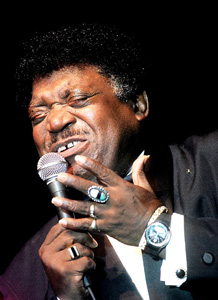 Percy Sledge has continued working, however, and still performs over 100 shows a year all over the world. He remains one of the most loved performers of all time, and never fails to emotionally connect with his audience.
Percy Sledge has continued working, however, and still performs over 100 shows a year all over the world. He remains one of the most loved performers of all time, and never fails to emotionally connect with his audience.
There was a lot of grumbling last year when he was inducted into the silly Rock & Roll Hall of Fame. People were actually saying that he was nothing more than a 'one hit wonder' who didn't deserve to be in there. Can you imagine?
As far as I'm concerned, Percy Sledge is a national treasure... Bless his Sweet Little Soul!
...May He Rest In Peace!
Here's an appreciation of Percy I wrote back in 2006:

True Love Travels On A Gravel Road
 Today's selection presented me with a bit of a problem. I had found it listed as both an A side and a B side, and was counting on the Atlantic discography at Global Dog to be the tiebreaker... only they seem to now be toast [Ed. Note: as of 1/7 Global Dog appears to be back in business. The verdict? - B side!]. In any event, this song you're listening to now is, in my opinion, the best (OK-second best) thing Percy Sledge ever recorded, and one of my favorite soul songs by anybody ever.
Today's selection presented me with a bit of a problem. I had found it listed as both an A side and a B side, and was counting on the Atlantic discography at Global Dog to be the tiebreaker... only they seem to now be toast [Ed. Note: as of 1/7 Global Dog appears to be back in business. The verdict? - B side!]. In any event, this song you're listening to now is, in my opinion, the best (OK-second best) thing Percy Sledge ever recorded, and one of my favorite soul songs by anybody ever. I first heard it when Peter Guralnick included it as the opening track on the companion CD to Sweet Soul Music - Voices From The Shadows, in 1992. As many of you know, this was right around the time my wife and I got engaged. The song was high in the rotation in those days, and still does either one of us in... I have yet to listen to it all the way through without jumping out of the ol' chair and singing along with a lump in my throat. I know, I'm a sap.
I first heard it when Peter Guralnick included it as the opening track on the companion CD to Sweet Soul Music - Voices From The Shadows, in 1992. As many of you know, this was right around the time my wife and I got engaged. The song was high in the rotation in those days, and still does either one of us in... I have yet to listen to it all the way through without jumping out of the ol' chair and singing along with a lump in my throat. I know, I'm a sap. For whatever reason, this song doesn't seem to get any press whatsoever. The silly album reviews of Percy's various greatest hits CDs in places like the 'all' music guide fail to even mention it. Who knows why. B side or not, I wanted to kinda wind down this year's posts with one of my true desert island 45s...
 Quin Ivy is yet another of those southern white boys who grew up listening to John R and Hoss Allen over WLAC. He fell in love with the music, and before long was emulating his heroes spinning R&B records as a dee-jay on his hometown radio station in Oxford, Mississippi. He moved on to WMPS in Memphis before landing a job on WLAY in Muscle Shoals, Alabama in the early sixties. Like everyone else in town back then, he got caught up in the 'songwriting fever' that was going around, and began writing lyrics for a young Rick Hall. Ivy was Hall's co-writer on two early Jimmy Hughes recordings, I'm Qualified and Lolly Pops, Lace And Lipstick, the B side of Fame's first release, top 20 R&B hit Steal Away.
Quin Ivy is yet another of those southern white boys who grew up listening to John R and Hoss Allen over WLAC. He fell in love with the music, and before long was emulating his heroes spinning R&B records as a dee-jay on his hometown radio station in Oxford, Mississippi. He moved on to WMPS in Memphis before landing a job on WLAY in Muscle Shoals, Alabama in the early sixties. Like everyone else in town back then, he got caught up in the 'songwriting fever' that was going around, and began writing lyrics for a young Rick Hall. Ivy was Hall's co-writer on two early Jimmy Hughes recordings, I'm Qualified and Lolly Pops, Lace And Lipstick, the B side of Fame's first release, top 20 R&B hit Steal Away. Quin opened a record store in Sheffield called Tune Town, and watched as Rick's new Fame studio grew. Fame soon had more business than it could handle, and Ivy approached Hall with an idea; what if he were to open his own small studio to record the people Hall was turning away? Rick was all for it, and Ivy opened his Norala (presumably Northern Alabama) studio across the street from Tune Town in late 1965. He had initially asked Rick to let him hire Dan Penn as his engineer, but he turned him down and introduced him to local guitarist Marlin Greene instead. The two became fast friends, and Ivy soon gave him a percentage of the business.
Quin opened a record store in Sheffield called Tune Town, and watched as Rick's new Fame studio grew. Fame soon had more business than it could handle, and Ivy approached Hall with an idea; what if he were to open his own small studio to record the people Hall was turning away? Rick was all for it, and Ivy opened his Norala (presumably Northern Alabama) studio across the street from Tune Town in late 1965. He had initially asked Rick to let him hire Dan Penn as his engineer, but he turned him down and introduced him to local guitarist Marlin Greene instead. The two became fast friends, and Ivy soon gave him a percentage of the business. Although there appears to be several versions of the story, this is basically what happened next; Jimmy Hughes' cousin was an orderly at Colbert County Hospital, and had begun singing with a local combo called the Esquires nights and weekends. The band was working the same fraternity circuit that the Fairlanes and the Mark Vs had done a few short years before. Percy Sledge and fellow Esquires Calvin Lewis and Andrew Wright had come up with a song that they thought could be a hit. They loaded Wright's Hammond B3 into the back of a pickup and hauled it down to Fame. Dan Penn recorded the tune, and pleaded with Hall for a chance to produce them. Rick flatly refused, and Dan sent them over to see Ivy at Norala.
Although there appears to be several versions of the story, this is basically what happened next; Jimmy Hughes' cousin was an orderly at Colbert County Hospital, and had begun singing with a local combo called the Esquires nights and weekends. The band was working the same fraternity circuit that the Fairlanes and the Mark Vs had done a few short years before. Percy Sledge and fellow Esquires Calvin Lewis and Andrew Wright had come up with a song that they thought could be a hit. They loaded Wright's Hammond B3 into the back of a pickup and hauled it down to Fame. Dan Penn recorded the tune, and pleaded with Hall for a chance to produce them. Rick flatly refused, and Dan sent them over to see Ivy at Norala. Jimmy Johnson was working part time at Tune Town, and had agreed to 'work the board' and engineer Norala's sessions on the primitive equipment Ivy had assembled. They worked and re-worked the song the Esquires had brought them in the fall of 1965, using studio musicians who were 'moonlighting' from Fame. The version they eventually brought to Rick Hall would feature Spooner Oldham on the Farfisa, Roger Hawkins on drums and Junior Lowe on the bass along with Marlin Greene on guitar. As soon as Hall heard it, he knew it was a hit, and called Jerry Wexler at Atlantic. Although Wexler was skeptical at first, Rick assured him that he felt "strong as death" that the song would be a #1 record.
Jimmy Johnson was working part time at Tune Town, and had agreed to 'work the board' and engineer Norala's sessions on the primitive equipment Ivy had assembled. They worked and re-worked the song the Esquires had brought them in the fall of 1965, using studio musicians who were 'moonlighting' from Fame. The version they eventually brought to Rick Hall would feature Spooner Oldham on the Farfisa, Roger Hawkins on drums and Junior Lowe on the bass along with Marlin Greene on guitar. As soon as Hall heard it, he knew it was a hit, and called Jerry Wexler at Atlantic. Although Wexler was skeptical at first, Rick assured him that he felt "strong as death" that the song would be a #1 record. He was right, of course. Wexler had worked out a deal with Ivy to lease the single (a deal that would include a 2% 'finders fee' for Rick Hall), but he wanted him to re-cut it, and clean it up a little. Happy to have landed a deal with a major label, Quin set to work polishing the track, making sure to fix the off-key horn section, and Percy's painfully out of tune vocals. He sent the new master off to New York, and Atlantic released When A Man Loves a Woman in April of 1966. It would quickly soar to #1 on both the R&B and pop charts, and was just an absolute monster. Much to Ivy's amazement, the big company had used the original version by mistake!
He was right, of course. Wexler had worked out a deal with Ivy to lease the single (a deal that would include a 2% 'finders fee' for Rick Hall), but he wanted him to re-cut it, and clean it up a little. Happy to have landed a deal with a major label, Quin set to work polishing the track, making sure to fix the off-key horn section, and Percy's painfully out of tune vocals. He sent the new master off to New York, and Atlantic released When A Man Loves a Woman in April of 1966. It would quickly soar to #1 on both the R&B and pop charts, and was just an absolute monster. Much to Ivy's amazement, the big company had used the original version by mistake! It's hard to overstate the incredible power of this song that came up out of the woods of Alabama and somehow slowed everything down, defining the meaning of romance for an entire generation in the process. It still gives me chills.
 Percy Sledge had put Muscle Shoals on the map, and his brand of deep southern soul along with it. Sledge's follow up record, Warm And Tender Love (the Joe Haywood song reportedly pitched to Wexler by Bobby Robinson backstage at the Apollo), would hit #5 R&B (#17 pop) despite Ivy's 'Mr. Whitebread' production. Incredibly, it was recorded at the same Norala session as all time Penn-Oldham classic It Tears Me Up in May of 1966, while When A Man Loves a Woman was still topping the charts.
Percy Sledge had put Muscle Shoals on the map, and his brand of deep southern soul along with it. Sledge's follow up record, Warm And Tender Love (the Joe Haywood song reportedly pitched to Wexler by Bobby Robinson backstage at the Apollo), would hit #5 R&B (#17 pop) despite Ivy's 'Mr. Whitebread' production. Incredibly, it was recorded at the same Norala session as all time Penn-Oldham classic It Tears Me Up in May of 1966, while When A Man Loves a Woman was still topping the charts.  Needless to say, Sledge had gone from hospital orderly and weekend warrior to the big time in about six months. Second only to Otis Redding in this poster at left, it must have been quite an adjustment. Suffering from 'nervous exhaustion,' Sledge reportedly checked himself in to the hospital where he used to work for a week in late 1966. Singles like Baby Help Me and Penn-Oldham's Out Of Left Field barely made the R&B top 40 in early 1967 and, as is often the case, Percy was having trouble duplicating his initial big smash.
Needless to say, Sledge had gone from hospital orderly and weekend warrior to the big time in about six months. Second only to Otis Redding in this poster at left, it must have been quite an adjustment. Suffering from 'nervous exhaustion,' Sledge reportedly checked himself in to the hospital where he used to work for a week in late 1966. Singles like Baby Help Me and Penn-Oldham's Out Of Left Field barely made the R&B top 40 in early 1967 and, as is often the case, Percy was having trouble duplicating his initial big smash. Ivy was able to build a new facility by then, however, and opened Quinvy Studios across town on Broadway in Sheffield. He would soon create his own labels as well, and great records by local talent like Tony Borders and Bill Brandon were released on his Quinvy and South Camp imprints. They remain some of the rarest, and best, of the Muscle Shoals 45s of the late sixties (if you can find them!).
Ivy was able to build a new facility by then, however, and opened Quinvy Studios across town on Broadway in Sheffield. He would soon create his own labels as well, and great records by local talent like Tony Borders and Bill Brandon were released on his Quinvy and South Camp imprints. They remain some of the rarest, and best, of the Muscle Shoals 45s of the late sixties (if you can find them!).Percy was back in the top ten with the fantastic Take Time To Know Her in the spring of 1968, and continued to tour constantly. Sudden Stop and My Special Prayer would hover around the top 40 later that year.
 In early 1969, RCA booked Elvis into Chips Moman's (and Dan Penn's) American Studios in Memphis. American was in the middle of an incredible run of hits (like Cry Like A Baby) at that point, and RCA was trying to 'capture lightning in a bottle' and revitalize the King's sagging career. The album they came up with is an absolute classic, with 'country soul' songs like Suspicious Minds, In The Ghetto, and Kentucky Rain becoming huge chart hits. The industry, of course, took notice, and Presley's 'comeback' had begun.
In early 1969, RCA booked Elvis into Chips Moman's (and Dan Penn's) American Studios in Memphis. American was in the middle of an incredible run of hits (like Cry Like A Baby) at that point, and RCA was trying to 'capture lightning in a bottle' and revitalize the King's sagging career. The album they came up with is an absolute classic, with 'country soul' songs like Suspicious Minds, In The Ghetto, and Kentucky Rain becoming huge chart hits. The industry, of course, took notice, and Presley's 'comeback' had begun.Quin Ivy apparently took notice as well. He had made the top 40 with Sledge's syrupy version of Love Me Tender in 1967, and figured if it was 'country soul' the people wanted, who better to give it to them than the man who helped invent it! Sledge covered Any Day Now (as Presley had done on the album), and broke the top 40 for Atlantic again in April of 1969. True Love Travels On A Gravel Road was written by 'Music Row' giants Dallas Frazier and 'Doodle' Owens and included on the Presley album. Ivy apparently recorded Percy's remarkable version we have here today in September of that year. It was released as the flip of Faithful And True, a Dan Penn-Marlin Greene slow dance, and may well have been the B side, as the romantic ballad was viewed as Percy's 'bread and butter'.
 I've long suspected that the positively awesome lead guitar on here is furnished by the great Eddie Hinton, and Bruce Schurman has confirmed for us over on the Mighty Field Of Vision Group that Hinton did play on the session along with Marlin Greene. He's not sure who takes the lead, however. In any event, neither side of the record even dented the charts. Changing times, along with Atlantic's declining interest in their R&B artists, may have contributed to that. I don't know. All I can say, once again, is how much this record continues to floor me. Boy, is it good.
I've long suspected that the positively awesome lead guitar on here is furnished by the great Eddie Hinton, and Bruce Schurman has confirmed for us over on the Mighty Field Of Vision Group that Hinton did play on the session along with Marlin Greene. He's not sure who takes the lead, however. In any event, neither side of the record even dented the charts. Changing times, along with Atlantic's declining interest in their R&B artists, may have contributed to that. I don't know. All I can say, once again, is how much this record continues to floor me. Boy, is it good.Quin Ivy walked away from the whole thing in 1970, and went on to become a professor of Business Administration back in Mississippi.
 Although nothing much was happening, Sledge hung in there with Atlantic until 1973 when a song called Sunshine barely made the charts. He signed with manager Phil Walden's Capricorn label the following year. Through a 'special arrangement' with Walden, the Ivy produced I'll Be Your Everything put Percy back in the R&B top 20 in late 1974. Disco was rearing its ugly head by then, and Sledge's charting days were soon over.
Although nothing much was happening, Sledge hung in there with Atlantic until 1973 when a song called Sunshine barely made the charts. He signed with manager Phil Walden's Capricorn label the following year. Through a 'special arrangement' with Walden, the Ivy produced I'll Be Your Everything put Percy back in the R&B top 20 in late 1974. Disco was rearing its ugly head by then, and Sledge's charting days were soon over.  Percy Sledge has continued working, however, and still performs over 100 shows a year all over the world. He remains one of the most loved performers of all time, and never fails to emotionally connect with his audience.
Percy Sledge has continued working, however, and still performs over 100 shows a year all over the world. He remains one of the most loved performers of all time, and never fails to emotionally connect with his audience.There was a lot of grumbling last year when he was inducted into the silly Rock & Roll Hall of Fame. People were actually saying that he was nothing more than a 'one hit wonder' who didn't deserve to be in there. Can you imagine?
As far as I'm concerned, Percy Sledge is a national treasure... Bless his Sweet Little Soul!
...May He Rest In Peace!




















5 Comments:
Red, I would like to use this article in our newsletter either as a link to it or copy and paste. Will that be OK? We are the Birmingham Record Collectors in Birmingham, AL.
Of course, Chuck... please do. I am familiar with your work through Len Wade, etc. You guys are great!
Thanks, Red. And I appreciate yours and Len's kind words.
Thank you again for all this great job and your ongoing passion. I didn't know about the "Sweet Soul" cd and will buy it.
As a (french) Soul passionate, and Elvis afficionados of the song, I can just love this note. xxx
Are there any African American blues singer left living? it's like true history is passing by they all will be missed!
Actions
Begin New Search
Refine Last Search
Cemetery Lookup
Add Burial Records
Help with Find A Grave
Find all Jacksons in:
• Rose Hill Memorial Park
• Corpus Christi
• Nueces County
• Texas
• Find A Grave
Top Contributors
Success Stories
Discussion Forums
Find A Grave Store
Logged in as:
Sharon Haywood
Contributor Tools
Log Out
Sponsor This Memorial!
Advertisement
Will S Jackson
Memorial
Photos
Flowers
Edit
Share
Learn about upgrading this memorial...
Birth: Aug. 13, 1913
Bastrop County
Texas, USA
Death: Apr. 4, 1991
Corpus Christi
Nueces County
Texas, USA
Will S. Jackson was born in Bastrop County, Texas on August 13, 1913 to the union of Isaac & Higgins Jackson. He professed a hope in Christ at an early age, & was a member of Pleasant Chapel AME Church until he moved to Corpus Christi. Upon moving to Corpus Christi, he united with Brooks Chapel AME Church. He remained a member until he was called home. Bro. Jackson took his final trip on Thursday April 4, 1991. Survivors include 2 sisters, Effie Canada, of Elgin, Texas; & Mattie Staples, of Bastrop; one brother, William Jackson, of Austin, Texas; & a host of nieces, nephews, other relatives, & friends. His obituary was published in the Corpus Christi Caller Times April 7, 1991 Page D11.
Burial:
Rose Hill Memorial Park
Corpus Christi
Nueces County
Texas, USA
Plot: South Lawn Lot #109 Plot #11
Edit Virtual Cemetery info [?]
Created by: Nanna
Record added: Aug 05, 2013
Find A Grave Memorial# 114973922
Will S Jackson
Added by: Nanna
Will S Jackson
Cemetery Photo
Added by: Sandra Cavazos Hernandez
Photos may be scaled.
Click on image for full size.
Rest in Peace cousin Will S. although I never got a chance to know you but your grandfather name is Edmund Haywood and he had a older brother by the name of Benjamin Haywood all of Bastrop ,Texas. Benjamin Haywood was my great great grandfather. any of th...(Read more)
- Sharon Haywood
Added: Jun. 8, 2015
Advertisement
Privacy Statement and Terms of Service
Oh my Jesus, I did not know he had gone to heaven with BB King being gone also do we have any legends left? are there any blues singles left from his time still alive ? I know we all have to leave this earth but it saddens me when I know that history is passing by and for the people that were born in 1970 and the 19 eighties does not have a clue of black blues singers music is different today. and it's a reason for the name rhythm and blues its classic!
Post a Comment
<< Home